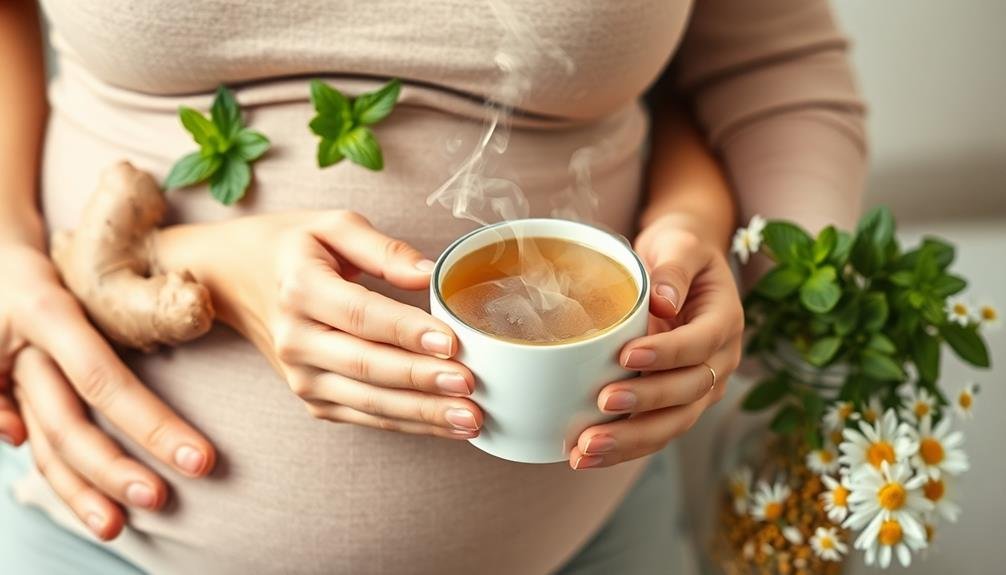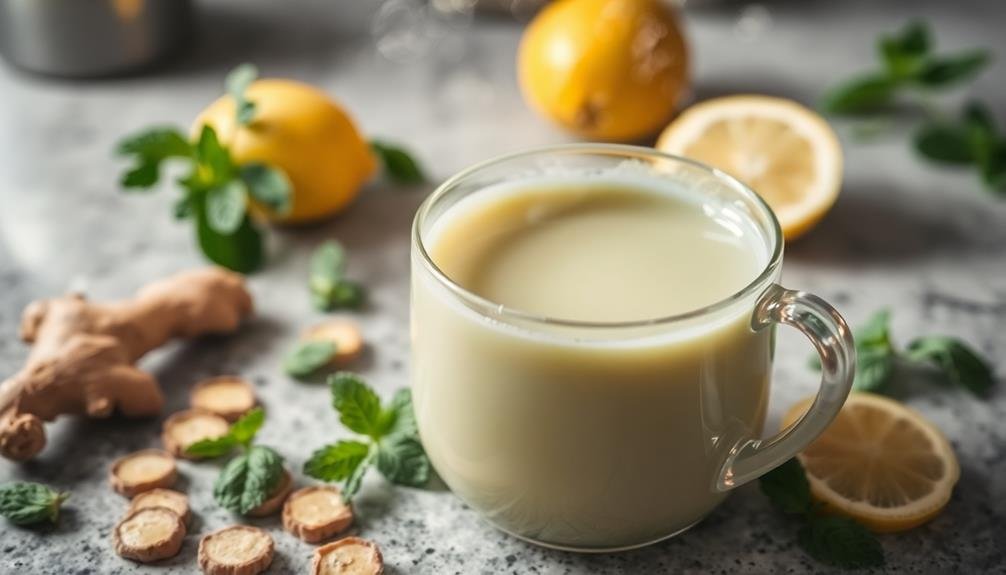You'll find relief from pregnancy nausea with a carefully crafted herbal tea blend. Ginger, peppermint, and chamomile are your go-to herbs, known for their stomach-settling properties. Start with a ginger base, add some peppermint for digestive support, and a touch of chamomile for its calming effects. Red raspberry leaf can be included for additional pregnancy benefits. Brew your blend using high-quality, organic herbs and steep for 5-10 minutes in hot water. Remember to consult your healthcare provider before trying any new herbal remedies during pregnancy. There's more to explore about maximizing the benefits of your nausea-fighting brew.
Understanding Pregnancy Nausea

Discomfort often accompanies the joy of pregnancy, with nausea being one of the most common symptoms. You'll likely experience this as "morning sickness," although it can strike at any time of day.
Pregnancy nausea typically begins around the sixth week and often subsides by the end of the first trimester, though some women may experience it throughout their pregnancy.
The exact cause of pregnancy nausea isn't fully understood, but hormonal changes play a significant role. Rising levels of human chorionic gonadotropin (hCG) and estrogen are believed to contribute to feelings of queasiness.
Other factors, such as heightened sense of smell and increased sensitivity to certain foods, can exacerbate nausea.
While unpleasant, pregnancy nausea is generally considered a normal part of early pregnancy and isn't harmful to you or your baby.
However, severe cases known as hyperemesis gravidarum can lead to dehydration and weight loss, requiring medical attention.
It's important to distinguish between typical pregnancy nausea and more serious conditions. If you're concerned about the severity of your symptoms, always consult your healthcare provider for proper guidance and treatment options.
Benefits of Herbal Tea
Herbal teas offer natural remedies for pregnancy nausea without the need for medication.
You'll find these teas provide a gentle, soothing effect on your stomach while keeping you hydrated.
As a safe hydration option, herbal teas can be a comforting alternative to plain water, helping you maintain fluid intake during pregnancy.
Natural Remedies for Nausea
Natural remedies offer a gentle approach to managing pregnancy-related nausea. When you're expecting, you might find relief from morning sickness through various non-pharmaceutical methods. These options can help alleviate discomfort without introducing potentially harmful substances to your developing baby.
Here's a quick reference guide to some popular natural remedies for pregnancy nausea:
| Remedy | How to Use | Effectiveness |
|---|---|---|
| Ginger | Tea, capsules, candies | High |
| Peppermint | Tea, essential oil | Moderate |
| Lemon | Water, aromatherapy | Moderate |
| Acupressure | Wristbands, self-massage | Varies |
| Vitamin B6 | Supplements | High |
You'll find that these remedies work differently for each person. It's important to listen to your body and consult with your healthcare provider before trying any new treatments. Remember, staying hydrated and eating small, frequent meals can also help manage nausea. If you're struggling with severe morning sickness, don't hesitate to seek medical advice, as there are safe prescription options available for persistent symptoms.
Safe Hydration Options
During pregnancy, staying hydrated is essential for both you and your baby's health. While plain water is always a safe choice, you might crave more flavorful options. Herbal teas can be an excellent alternative, providing hydration and potential benefits for managing nausea.
When choosing herbal teas, opt for caffeine-free varieties that are specifically labeled as safe for pregnancy. Ginger tea is a popular choice, known for its ability to calm an upset stomach and reduce nausea. Peppermint tea can also help soothe digestive discomfort and provide an invigorating taste. Chamomile tea may offer relaxation benefits, but consult your healthcare provider before consuming it regularly.
Other safe options include rooibos tea, which is rich in antioxidants, and lemon balm tea, which can help with anxiety and sleep issues.
Remember to avoid teas containing herbs like licorice root, rosemary, and sage, as they may have adverse effects during pregnancy. Always check the ingredients list and consult your doctor if you're unsure about a particular tea blend.
Safe Herbs During Pregnancy

Throughout pregnancy, many women seek safe, natural remedies to alleviate common discomforts. When it comes to herbal teas, it's essential to choose herbs that are known to be safe during pregnancy.
Ginger is a popular choice, as it's effective in reducing nausea and is generally considered safe for expectant mothers. Peppermint is another herb that can help with digestive issues and mild nausea, though you should use it in moderation.
Chamomile is often recommended for its calming properties, but you should consult your healthcare provider before consuming it regularly. Red raspberry leaf tea is believed to strengthen the uterus and prepare it for labor, but it's typically advised for use in the second and third trimesters only.
Lemon balm and rooibos are caffeine-free options that can provide a soothing effect without known risks.
Ginger: Nature's Nausea Fighter
Ginger stands out as a powerful ally against pregnancy nausea due to its natural anti-nausea properties.
You'll find that this root can effectively calm your stomach and reduce feelings of queasiness.
For ideal results, aim to consume between 250mg to 1g of ginger per day, either in tea form or as supplements approved by your healthcare provider.
Ginger's Anti-Nausea Properties
Why has ginger been a go-to remedy for nausea for centuries? The answer lies in its powerful anti-nausea properties. Ginger contains compounds called gingerols and shogaols, which have been shown to reduce stomach discomfort and quell nausea.
When you consume ginger, these compounds interact with your digestive system, helping to calm an upset stomach and alleviate feelings of queasiness. They work by speeding up gastric emptying and reducing the release of certain chemicals that can trigger nausea.
Here's a quick look at ginger's anti-nausea benefits:
| Benefit | How it Helps |
|---|---|
| Gastric Motility | Improves digestion |
| Serotonin Regulation | Balances mood |
| Anti-inflammatory | Reduces stomach irritation |
| Antispasmodic | Eases stomach cramps |
| Saliva Production | Aids in digestion |
Research has shown ginger to be particularly effective for pregnancy-related nausea, motion sickness, and chemotherapy-induced nausea. It's safe for most people, including pregnant women, when consumed in moderate amounts. You can enjoy ginger's benefits through various forms, such as fresh root, powder, capsules, or tea.
Recommended Ginger Dosage
Now that we recognize ginger's potent anti-nausea effects, let's explore the ideal dosage for managing pregnancy nausea.
When using ginger for morning sickness, it's essential to strike a balance between effectiveness and safety.
For pregnant women, the recommended daily intake of ginger is typically between 1,000 to 1,500 milligrams, divided into several doses throughout the day. You can achieve this by consuming 1/4 to 1/2 teaspoon of freshly grated ginger root or 1/8 to 1/4 teaspoon of ground ginger powder.
If you're using ginger tea bags, steep one bag in hot water for 5-10 minutes, up to four times daily.
It's important to start with smaller amounts and gradually increase the dosage if needed. Pay attention to your body's response and consult your healthcare provider before incorporating ginger into your routine.
While ginger is generally considered safe during pregnancy, excessive consumption may lead to mild side effects like heartburn or digestive discomfort.
Peppermint for Digestive Relief

Among the most effective herbal remedies for pregnancy nausea, peppermint stands out for its soothing properties. It's widely known for its ability to calm an upset stomach and provide digestive relief. When you're experiencing pregnancy-related nausea, incorporating peppermint into your herbal tea blend can offer significant comfort.
Peppermint contains menthol, which helps relax the muscles of your gastrointestinal tract, reducing spasms and easing discomfort. It also has anti-inflammatory properties that can help alleviate bloating and gas. To use peppermint for nausea relief, steep 1-2 teaspoons of dried peppermint leaves in hot water for 5-10 minutes.
While peppermint is generally safe during pregnancy, it's important to consume it in moderation. Too much peppermint can potentially worsen heartburn, a common pregnancy symptom. If you're prone to acid reflux, you might want to limit your intake or consult your healthcare provider.
You can combine peppermint with other pregnancy-safe herbs like ginger or lemon balm for a more potent nausea-fighting blend.
Remember to always check with your doctor before incorporating new herbal remedies into your pregnancy routine.
Chamomile: Soothing and Calming
Chamomile, another popular herb for pregnancy nausea, offers both soothing and calming effects. You'll find this gentle herb in many pregnancy-safe tea blends due to its ability to ease digestive discomfort and promote relaxation.
Chamomile's anti-inflammatory properties can help reduce stomach irritation, while its mild sedative effects may alleviate stress-related nausea.
When brewing chamomile tea, steep one teaspoon of dried flowers in hot water for 5-7 minutes. You can drink it warm or let it cool for a revitalizing iced tea.
It's best to limit your intake to 1-2 cups per day during pregnancy, as excessive consumption may cause uterine contractions.
Chamomile pairs well with other pregnancy-safe herbs like ginger and lemon balm, creating a more potent blend for nausea relief.
However, if you're allergic to plants in the daisy family, avoid chamomile altogether. Always consult your healthcare provider before adding any new herbs to your pregnancy diet.
They'll help you determine if chamomile is right for you and advise on proper dosage. Remember, while chamomile is generally safe, moderation is key during pregnancy.
Lemon Balm's Gentle Effects

Lemon balm, a member of the mint family, offers another gentle option for easing pregnancy nausea. This herb's mild lemony scent and flavor can help settle your stomach and reduce feelings of queasiness.
You'll find that lemon balm has a calming effect on your digestive system, which can be particularly helpful during pregnancy when your body is more sensitive to nausea triggers.
When you're brewing lemon balm tea, steep it for about 5-10 minutes to extract its beneficial compounds. The tea contains rosmarinic acid, which has anti-inflammatory properties that may help reduce stomach discomfort.
You'll also benefit from lemon balm's mild sedative effects, which can help you relax and potentially alleviate stress-induced nausea.
It's important to note that while lemon balm is generally considered safe during pregnancy, you should always consult your healthcare provider before adding any new herbal remedies to your routine.
They can advise you on the appropriate dosage and frequency of use. When combined with other pregnancy-safe herbs like ginger or peppermint, lemon balm can be a valuable addition to your anti-nausea tea blend.
Red Raspberry Leaf Tea
Red raspberry leaf tea, a centuries-old remedy, offers unique benefits for pregnant women beyond its potential to ease nausea. This herbal infusion is rich in vitamins and minerals, including iron, calcium, and magnesium. It's believed to strengthen the uterus, potentially easing labor and delivery.
When you're brewing red raspberry leaf tea, you'll notice:
- A light, fragrant aroma reminiscent of fresh berries
- A subtle, earthy flavor with a slightly sweet aftertaste
- A clear, amber-colored liquid that darkens as it steeps
You can start with one cup a day in the second trimester, gradually increasing to three cups daily in the third trimester. However, it's vital to consult your healthcare provider before adding any herbal tea to your pregnancy regimen.
While red raspberry leaf tea is generally considered safe, some women may experience Braxton Hicks contractions after drinking it. If you notice any unusual symptoms, stop drinking the tea and speak with your doctor.
Creating Your Nausea-Reducing Blend

Creating a personalized herbal tea blend can be an effective way to combat pregnancy nausea. To make your own blend, start with a base of ginger tea, which is known for its stomach-settling properties. Add 1-2 teaspoons of dried ginger root to your tea infuser.
Next, include peppermint leaves, about 1 teaspoon, to help soothe your digestive system and reduce nausea. For a calming effect, add a pinch of chamomile flowers. If you're experiencing heartburn along with nausea, consider adding a small amount of marshmallow root.
Red raspberry leaf, discussed earlier, can also be incorporated for its potential benefits during pregnancy. When creating your blend, it's vital to use high-quality, organic herbs to guarantee safety.
Start with small amounts of each herb and adjust according to your taste preferences and how your body responds. Steep your blend in hot water for 5-10 minutes, strain, and enjoy.
Remember to consult with your healthcare provider before consuming any herbal teas during pregnancy, as some herbs may not be suitable for everyone. You can experiment with different ratios and combinations to find the perfect blend that works best for your pregnancy nausea.
Brewing Methods for Maximum Benefits
To get the most out of your pregnancy nausea-reducing tea blend, you'll need to master a few key brewing techniques.
Start by paying attention to steeping time and temperature, as well as the proper herb-to-water ratio for your specific blend.
You might also want to try a cold brew technique, which can offer a milder flavor and potentially preserve more of the herbs' beneficial compounds.
Steeping Time and Temperature
Proper steeping is essential for extracting the full benefits of your herbal tea blend for pregnancy nausea. The ideal steeping time and temperature can vary depending on the herbs in your blend, but generally, you'll want to aim for a water temperature between 190°F and 205°F (88°C to 96°C). This range guarantees that you don't scorch delicate herbs or under-extract hardier ones.
For most pregnancy-safe herbal blends, steep for 5 to 10 minutes. This duration allows enough time for the water to extract the beneficial compounds from the herbs without becoming overly bitter. If you're using a tea ball or infuser, make sure it's large enough to allow the herbs to expand and circulate freely in the water.
To guarantee you're getting the most out of your herbal tea blend:
- Use a timer to avoid over-steeping
- Cover your cup or teapot while steeping to retain heat and volatile oils
- Gently swirl or stir the tea occasionally during steeping
Proper Herb-To-Water Ratio
The key to a potent herbal tea blend lies in striking the right balance between herbs and water. For pregnancy nausea relief, you'll want to use about 1 to 2 teaspoons of dried herbs per cup of water. If you're using fresh herbs, double this amount to 2 to 4 teaspoons per cup.
Start with a lower ratio and adjust to your taste preferences and the strength of the herbs. Remember, some herbs are more powerful than others. For example, ginger and peppermint are strong flavors, so you might use less of these compared to milder herbs like chamomile or lemon balm.
If you're making a larger batch, maintain the same ratio. For a quart (4 cups) of water, use 4 to 8 teaspoons of dried herbs or 8 to 16 teaspoons of fresh herbs. Always measure your herbs accurately to guarantee consistency in flavor and strength.
Don't overstuff your tea infuser or tea ball. Leave enough space for the herbs to expand as they steep. This allows for better water circulation and maximum extraction of the herbs' beneficial compounds.
Cold Brew Technique
Patience is key when it comes to the cold brew technique for herbal teas. This method involves steeping your pregnancy-safe herbs in cold water for an extended period, typically 8 to 12 hours. It's an excellent option for those who find hot teas unappealing during pregnancy or want to preserve the delicate flavors and nutrients of the herbs.
To cold brew your herbal tea blend:
- Place your herbs in a glass jar or pitcher.
- Cover them with cold, filtered water.
- Seal the container and refrigerate overnight.
The cold brew technique results in a smoother, less bitter taste compared to hot brewing. It's also less likely to extract tannins, which can sometimes upset a sensitive stomach.
You'll find that the flavors are more subtle and revitalizing, making it easier to sip throughout the day.
When your tea is ready, strain out the herbs and enjoy it over ice or at room temperature. You can store the cold brew in the refrigerator for up to 3 days, allowing you to prepare larger batches in advance.
This method is particularly effective for herbs like peppermint and ginger, which are known for their nausea-relieving properties.
Precautions and Considerations

Several important precautions and considerations must be taken into account when using herbal tea blends during pregnancy.
First, consult your healthcare provider before incorporating any new herbal teas into your diet. Some herbs can interact with medications or have adverse effects on pregnancy.
Always choose high-quality, organic herbal teas to minimize exposure to pesticides and contaminants. Stick to reputable brands and avoid untested or potentially harmful ingredients.
Limit your intake to 1-2 cups per day, as excessive consumption may lead to unwanted side effects.
Be aware that not all herbs are safe during pregnancy. Avoid teas containing black cohosh, blue cohosh, dong quai, or pennyroyal, as they may cause complications.
Also, steer clear of caffeinated teas, which can increase the risk of miscarriage and low birth weight.
Pay attention to your body's response to the tea blend. If you experience any unusual symptoms or discomfort, discontinue use immediately and consult your doctor.
Remember that while herbal teas can offer relief, they're not a substitute for proper medical care during pregnancy. Always prioritize your health and your baby's well-being when choosing and consuming herbal tea blends.
Frequently Asked Questions
Can Herbal Teas Replace Prescribed Medication for Severe Pregnancy Nausea?
You shouldn't replace prescribed medication with herbal teas for severe pregnancy nausea. While some teas may offer mild relief, they can't match the effectiveness of doctor-prescribed treatments. Always consult your healthcare provider before making changes to your medication.
Are There Any Herbal Teas That Should Be Avoided During Pregnancy?
You should avoid certain herbal teas during pregnancy. Steer clear of chamomile, licorice root, and peppermint. Don't drink sage, parsley, or hibiscus teas either. Always consult your doctor before consuming any herbal teas while pregnant.
How Often Should I Drink Herbal Tea to Manage Pregnancy Nausea?
You can drink herbal tea 2-3 times daily to manage pregnancy nausea. Start with small amounts and increase gradually. Listen to your body and consult your healthcare provider for personalized advice on frequency and safety.
Can I Drink Cold Herbal Tea Instead of Hot for Nausea Relief?
Yes, you can drink cold herbal tea for nausea relief. It's just as effective as hot tea. You'll still get the benefits of the herbs, and the coolness might be more soothing for your stomach during pregnancy.
Are There Any Potential Side Effects of Drinking Herbal Teas During Pregnancy?
Yes, there can be side effects when drinking herbal teas during pregnancy. You should be cautious as some herbs may cause complications. It's best to consult your doctor before consuming any herbal teas while pregnant.
In Summary
You've now learned about several herbal teas that can help ease pregnancy nausea. Remember to always consult your healthcare provider before trying new remedies. When you're ready, create your own blend using ginger, peppermint, and red raspberry leaf. Brew it carefully and enjoy in moderation. With these natural solutions, you're empowering yourself to manage morning sickness more comfortably. Stay hydrated and listen to your body as you navigate this exciting time.





Leave a Reply